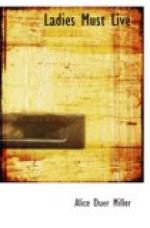It was about the middle of February when he received one morning a letter from Nancy Almar. He knew her handwriting. She was always sending him little notes of one kind or another. This one was very brief.
“Clever mouse! So it knew a way to get out all the time!”
All day he speculated on the meaning of this strange message. Had Nancy discovered some proof of the nature of his engagement? Had Christine been moved by pity to tell Hickson the truth? On the whole he inclined to think that this was the explanation.
The next day he knew he had been mistaken. He had a letter from Laura Ussher—not the first in the series—urging him to come back at once.
“Max,” she wrote, with a haste that made her almost indecipherable, “you must come. What are you dreaming of—to leave a proud, beautiful, impressionable creature like Christine the prey to so finished a villain as Linburne? You are not so ignorant of the ways of the world as not to know his intentions. Most people are saying you deserve everything that is happening to you. I try to explain, but I know you saw enough while you were here to be put upon your guard. Why don’t you come? I must warn you that if you do not come at once you need not come at all.”
Riatt had just come in; it was late in the afternoon. The letters were lying on his writing table; and as he finished this one, he raised his eyes and looked at Christine’s picture.
He did not believe Laura’s over-wrought picture. Christine was no fool, Linburne no villain. There was probably a little flirtation, and a good deal of gossip. But that would all be put a stop to by the announcement of Christine’s engagement to Hickson. He did not even feel annoyed at his cousin’s suggestion that he did not know his way about the world. He knew it rather better than she did, he fancied.
And having so disposed of his mail, he took up the evening paper which lay beneath it, and read the first headline:
Mrs. Lee Linburne to seek divorce: Wife of well-known multimillionaire now at Reno—
As he read this a blind rage swept over Riatt. He did not stop to inquire why if he were willing to give Christine up to Hickson he was infuriated at the idea of Linburne’s marrying her; nor why, as he had allowed himself to be made use of, he was angry to find that he had been far more useful than he had supposed. He only knew that he was angry, and with an anger that demanded instant action.
He looked at his watch. He had time to catch a train to Chicago. He went upstairs and packed. He knew that what he was doing was foolish, that he would poignantly regret it, but he never wavered an instant in his intention.
He reached New York early in the afternoon. He had notified no one of his departure, and he did not announce his arrival. He went straight to the Fenimers’ house—not indeed expecting to find Christine at home at that hour, but resolved to await her return.




